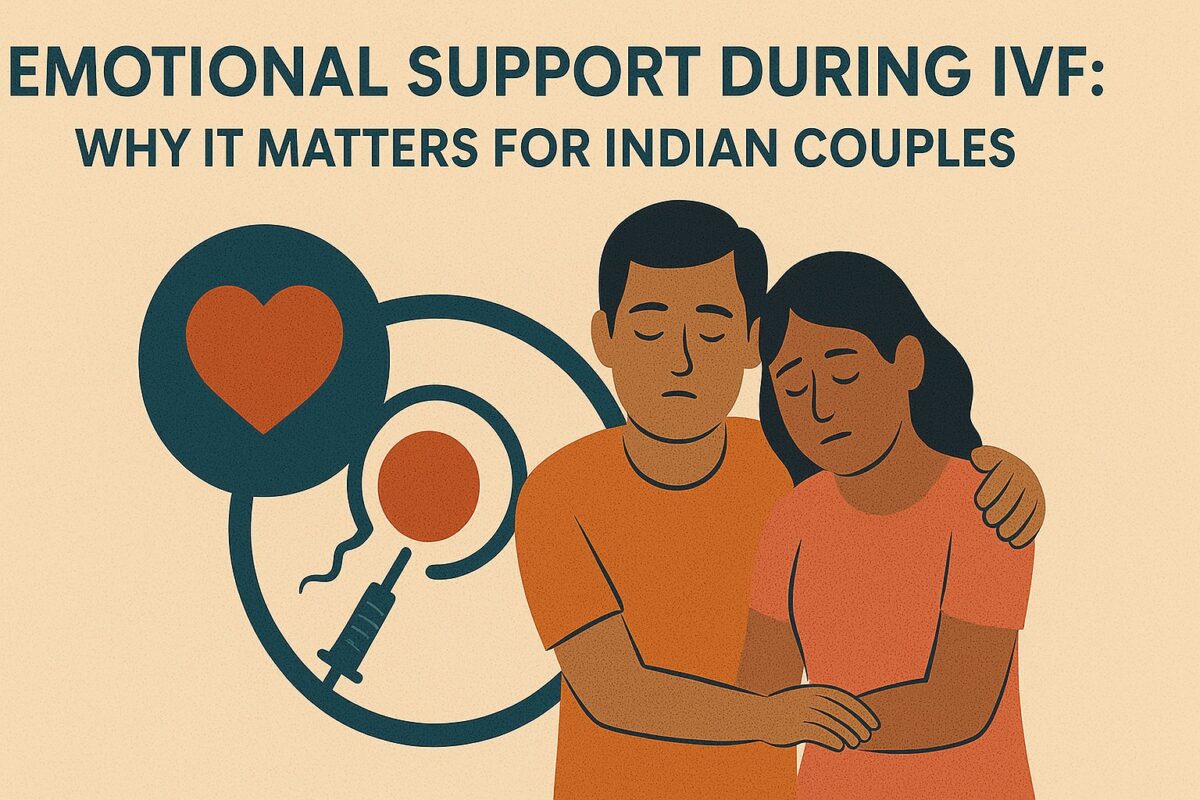When you think of IVF (In Vitro Fertilization), what usually comes to mind? Most people think of the medical procedure, the egg retrieval, the embryo transfer, and the excitement of a potential pregnancy. But here’s the thing: IVF is not just a physical journey; it’s an emotional rollercoaster, especially in a country like India where societal pressures around fertility are often high.
In this article, we’re going to explore why emotional support during IVF is so important and how it plays a vital role in improving the chances of success. We’ll also touch on how counselling can be a game-changer for couples undergoing fertility treatment. So, if you’re exploring IVF in Jalandhar or any part of India, grab a cup of chai, and let’s dive in!
The Emotional Rollercoaster of IVF Treatment
IVF is not just a medical procedure; it is a test of emotional endurance. You may not have expected to face the ups and downs that come with it. From the initial consultation to the final test results, there’s an emotional aspect to every stage of IVF.
- Anxiety about the Procedure:
The first step towards IVF is typically filled with anxiety. Couples wonder, “Will this work?” or “What if it doesn’t?” The unknowns can be overwhelming. - Hormonal Changes:
IVF involves hormone injections that stimulate the ovaries. These hormones can cause mood swings, fatigue, and physical discomfort, adding an extra layer of stress. Many women report feeling emotionally drained during this phase. - The Waiting Game:
Once the embryo is transferred, there’s the agonizing wait for the pregnancy test. This waiting period can cause extreme anxiety and stress, especially in couples who have experienced previous failed attempts.
It’s not just about the physical toll but the emotional strain that makes IVF a challenging process for many couples in India. The good news is that emotional support can significantly ease this burden.
Common Emotional Challenges Faced by Couples
Couples undergoing IVF often face a wide range of emotional challenges. These challenges are not just about the process but also how infertility is viewed in society.
- Feelings of Guilt and Shame:
Women often feel responsible for infertility. In many Indian families, the societal expectation is that the woman must conceive. This can lead to feelings of guilt and shame, even if infertility has nothing to do with her health. - Pressure from Family and Friends:
India has strong social and family structures. Extended families often ask personal questions like, “Why don’t you have children yet?” or “When will you give us grandchildren?” This can cause additional stress, as couples may feel they’re constantly under scrutiny. - Marital Strain:
The emotional toll of IVF can sometimes strain the relationship. The pressure to succeed, along with the physical and emotional toll, can lead to misunderstandings and miscommunication between partners. Open communication and mutual support are key to getting through this together.
Why IVF Emotional Support Matters
When undergoing IVF, emotional support becomes just as crucial as the medical treatment itself. Here’s why:
- Boosts Mental Resilience:
Emotional support helps couples build mental resilience, enabling them to face the challenges of IVF with hope and strength. Knowing that you are not alone in your journey can reduce feelings of isolation and despair. - Improves Success Rates:
According to research, stress can negatively impact IVF outcomes. High stress levels can affect hormone production and may even reduce the chances of implantation. Managing emotions and reducing stress can improve the success rate of IVF, especially for women undergoing the procedure. - Helps in Coping with Failure:
IVF doesn’t always work on the first try. Many couples in India go through multiple cycles before achieving success. In such cases, emotional support helps couples cope with failure, manage their grief, and prepare for the next attempt.
The Role of IVF Counselling in Emotional Support
One of the best ways to manage the emotional challenges of IVF is through IVF counselling. Here’s how IVF counselling can make a significant difference:
- Counselling Before IVF:
Before starting IVF, it’s important to talk about your emotional well-being. Counsellors can guide you on how to manage your expectations, reduce anxiety, and discuss any concerns you may have. This helps set realistic expectations and prepares you for the journey ahead. - Support During IVF:
Throughout the IVF process, counselling can help manage stress. Trained IVF counsellors can provide coping strategies for dealing with anxiety, mood swings, and the ups and downs of treatment. Couples can also talk about their fears, expectations, and frustrations, which helps them process their emotions in a healthy way. - Post-IVF Counselling:
Whether IVF results in pregnancy or not, counselling after the process is essential. For those who experience a failed cycle, having someone to talk to can help them understand their emotions and prevent feelings of hopelessness. In cases of success, counselling can also help adjust to the emotional changes of pregnancy.
How Partners Can Provide Emotional Support During IVF
The emotional journey of IVF isn’t one that can be tackled alone. A supportive partner can make all the difference. Here’s how partners can play an active role:
- Offer Physical and Emotional Reassurance:
IVF can be physically exhausting. Simple gestures like preparing a comforting meal, taking care of household chores, or even just being present can provide immense emotional relief. - Communicate Openly:
IVF can put a strain on communication. However, it’s crucial for couples to express their feelings honestly and support each other. If one partner feels anxious or sad, the other should listen and offer reassurance. - Seek Counselling Together:
Many couples find it helpful to attend counselling sessions together. It provides an opportunity to strengthen their emotional connection and gain a shared perspective on the process.
IVF Support Groups: The Power of Shared Experiences
When undergoing IVF, it’s natural to feel isolated. But there’s a growing network of IVF support groups, both online and offline, that can provide a space to share experiences, get advice, and find comfort in knowing others are going through the same thing.
In India, several IVF support groups exist, where individuals and couples can share their stories, ask questions, and offer support to one another. Being a part of these groups can reduce feelings of loneliness and create a sense of community.
The Importance of Choosing an IVF Centre with Emotional Support Services
If you’re considering IVF, it’s essential to choose an IVF centre in Jalandhar or any other city that not only provides excellent medical services but also offers emotional support and counselling. Some centres provide:
- In-house IVF counsellors
- Therapy sessions to manage anxiety and depression
- Partner support groups
- Workshops on IVF stress management
It’s always a good idea to inquire whether the clinic you choose provides these services, as they can play a crucial role in the success of your IVF journey.
Conclusion: Take the Emotional Journey Seriously
Embarking on the IVF journey is not just about medical procedures; it’s about managing emotions, handling stress, and maintaining hope. Emotional support during IVF is as essential as the physical treatment itself. Whether it’s through IVF counselling, the support of your partner, or joining an IVF support group, taking care of your mental health can make a significant difference in your IVF experience.
If you are in Jalandhar or anywhere in India, remember to seek help from both medical and emotional professionals. With the right support, your IVF journey can be more hopeful, less stressful, and ultimately successful.





